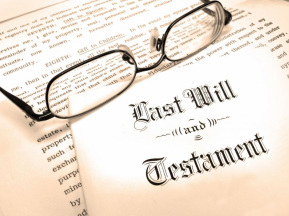Wills & Estate PlanningProbate __________________________________________________ Probate is a general term for the entire process of administration of estates of dead persons, including those without wills, with court supervision (probate court). When a person dies, his or her estate must go through probate. If the decedent leaves a will directing how his or her property should be distributed after death, the probate court must determine if it should be admitted to probate and given legal effect. If the decedent dies intestate—without leaving a will—the court appoints a personal representative to administer and distribute the decedent's assets according to the laws of hereditary succession. Wills ____________________________________________________ Wills are the most common way for people to state how their property and affairs should be distributed and handled after their deaths. If a person dies without a valid will and did not make alternative arrangements to distribute property, a probate court must step in to divide up the estate using legal defaults that give property to surviving relatives. Living Wills _____________________________________________________ Living wills are not really wills at all. Instead, a living will (which also may be known as a healthcare directive or directive to physicians) is a document that expresses a person's desires and preferences about medical treatment in case he or she becomes unable to communicate these instructions during terminal illness or permanent unconsciousness. Durable Power of Attorney _____________________________________________ A durable power of attorney differs from a living will in that it may direct the attorney-in-fact to carry out the living will's instructions or it may allow the attorney-in-fact to use his or her own judgment. A durable power of attorney may be used whenever the individual granting the power cannot make his or her own health care decision. This document gives an attorney-in-fact legal power to make decisions; it does not depend on terminal illness or permanent unconsciousness to become effective. What is Estate Planning? ____________________________________________ Estate planning is one of the most important steps any person can take to make sure that their final property and health care wishes are honored, and that loved ones are provided for in their absence. Though often overlooked or put off in favor of more immediate concerns, a comprehensive estate plan can resolve a number of legal questions that arise whenever anyone dies. What is an "Estate"? Your "estate" consists of all property owned by you at the time of your death, including:
How Can an Estate Plan Help? Regardless of your age, or the size and complexity of your estate, an estate plan can accomplish the following:
Dealing with asset distribution and the probate process when a love one passes away is complicated and an emotional time for the family. The attorneys at the Law Offices of Normay W. Jones can explain all options available to you in meeting your estate planning goals and fulfilling the needs of your loved ones -- whether you need to revise an existing will or create a comprehensive estate plan. Please reach out to us to assist you with your needs in estate planning. |
OFFICE HOURS
|





